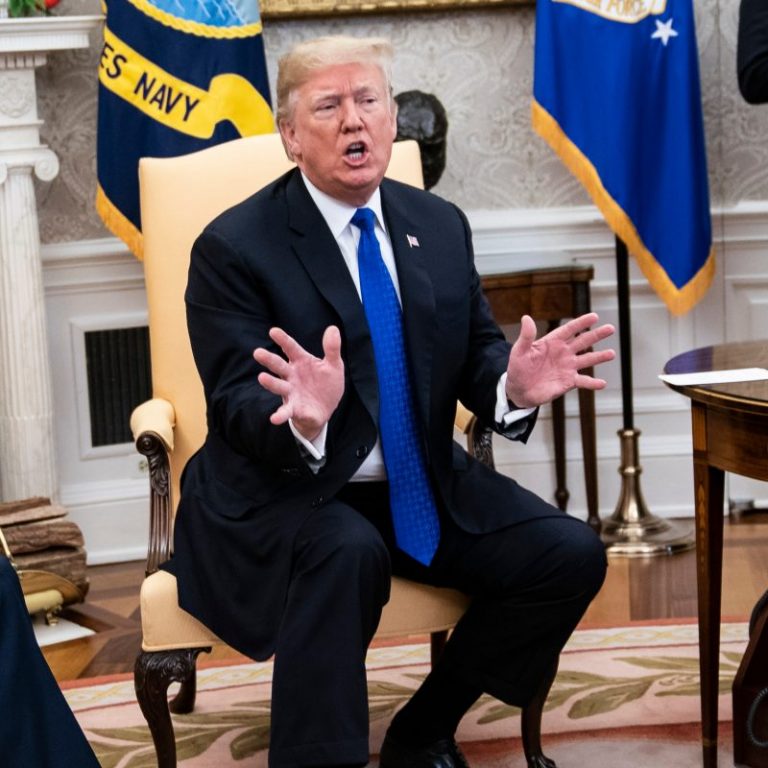Speaking in Orlando in November 2015, Republican presidential front-runner Donald Trump revisited the theme that launched his candidacy: immigration.
Breathing heavily into the microphone he crouched over, Trump swore to deal with immigrants with an iron fist.
“The birthright citizenship, the anchor baby, birthright citizenship, it’s over, not going to happen,” he said near the end of his speech. “Hundreds of thousands of people a year, coming from all over the world, by the way. It is over.”
He was referring to the right granted by the 14th Amendment: Those born in the United States become citizens at birth. Picking up on right-wing rhetoric that insisted that large numbers of immigrants were coming to the country simply to have children — pejoratively dubbed “anchor babies” who’d allow their parents to access government resources — Trump promised to end the practice, should he be elected president.
He was elected president. He did not end the practice.
On no other issue, including building the wall on the U.S.-Mexico border, was Trump so insistent that he would prevail without actually getting anything done.
For the first two years of his presidency, he didn’t really mention it much, perhaps recognizing that Supreme Court precedent meant there wasn’t much he could do. But as the 2018 election loomed and he and his allies tried to stoke concerns about immigration to benefit them in the midterms (without success), he revived the idea. In an interview, on Twitter and in speeches, he pledged to end the practice. He lined up putative experts who agreed with his take on the 14th Amendment’s constitutionality, such as attorney John Eastman.
Trump raised it again in 2019 and again after losing his reelection bid in 2020. He insisted that an executive order could change the policy — or at least trigger consideration by the newly solid-right Supreme Court. It didn’t happen.
But now he promises that it will if he wins in 2024.
On Tuesday, Trump’s campaign for the upcoming Republican nominating contest released a video in which Trump again pledges to quickly enact a ban on birthright citizenship.
“Even though these millions of illegal border-crossers have entered the country unlawfully, all of their future children will become automatic U.S. citizens,” Trump says in the video. “ … They’ll be eligible for welfare, taxpayer-funded health care, the right to vote, chain migration and countless other government benefits, many of which will also profit the illegal-alien parents.”
It is important to point out that Trump is once again misrepresenting the status of people seeking to enter the United States. He (and, again, many of his allies) likes to suggest that millions and millions of people have entered the country illegally and are illicitly remaining. In reality, many of those who enter the country apply for asylum and are granted the right to stay while their asylum claims are considered. Fewer than 1 million immigrants, many parents with existing children, have been granted release since President Biden took office. Some almost-certainly-smaller number entered the country illegally without being detected.
The legal challenge for Trump is that the question of what the 14th Amendment allows is by now well-established — and given that it’s a constitutional amendment, reinterpretation by a friendly court, while not impossible, presents a very high bar to clear. The New York Times’s Jonathan Swan (who interviewed Trump in 2018 about the issue) notes that were he to win, Trump would almost certainly take office in 2025 with a more pliant coterie of aides, the sorts of advisers who might be happy to just toss an executive order about birthright into the mix.
But this is really just about politics. Again, Trump won the nomination in 2016 largely because of his positions on immigration, and it’s a subject where he both has an advantage over competitors such as Florida Gov. Ron DeSantis (R) and that is much more salient to the political conversation than, say, covid-19 restrictions.
The politics are unsubtle in Trump’s new statement: These children of immigrants will almost necessarily (in his telling) end up on welfare or otherwise straining government resources. Yet this was adjudicated during Trump’s presidency; immigrants and their children provide more revenue to the country over the long run than they use. What’s more, having a native-born child is not a guarantee that an immigrant will be allowed to stay in the country. From 2013 to 2019, at least 250,000 people with citizen children were deported by U.S. Immigration and Customs Enforcement.
It’s not clear how many children in the United States are citizens born to undocumented mothers. About 16 million native-born children of immigrant parents lived in the United States in 2021 — but that includes naturalized immigrants, other legal immigrants and children with an immigrant father. In 2019, the Pew Research Center estimated that about 5 million U.S.-born children of undocumented immigrants lived in this country — a group that could also more generously be called American kids.
What Trump wants to do is send the same message he’s always sent: He’ll treat immigrants more harshly than his competitors. More opaquely, Trump is also promising to take a stand against the perceived diversification of the United States and the erosion of the White majority, an important motivating issue for many Republicans and much of his political base. It’s “great replacement theory”-adjacent, at best.
After Trump’s renewal of this idea, his critics on the right were quick to point out that he’s promised the same thing before without following through. But that’s the story of Trump’s approach to immigration: all promise and anger and little follow-through. For Trump, the anger is what’s actually useful.

